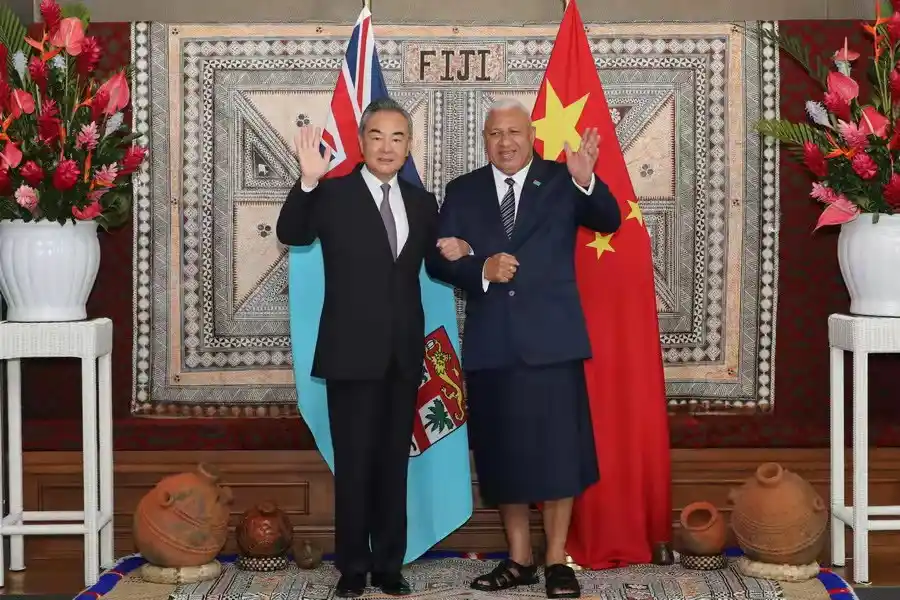Even the small islands scattered in the far-away Pacific are standing up to China. After Fiji and the Federated States of Micronesia (FSM) rejected Beijing's draft communique and five-year action plan on regional trade and security, China hastily cobbled up a paper on ‘mutual respect and common development’.
It is clear that Beijing is not yet giving up easily in a geo-strategic area that connects the American territory of Guam to close ally Australia. Sensing opposition, the new paper on ‘mutual respect and common development’ has dropped key clauses like free trade, joint policing and cybersecurity measures.
Chinese Foreign Minister Wang Yi is currently on a ten-day eight nation trip to the islands–Samoa, Tonga, Kiribati, Papua New Guinea, Vanuatu, Solomon Islands, Niue and Vanuatu from May 26 to June 4. In the face of concerns expressed by some of the nations, China had to beat a retreat and tweak strategy during Wang's unprecedented tour to the island nations.
#Gravitas | The Pacific has become the new battleground for China and Australia. Both countries are fishing for influence. China has dispatched its foreign minister to Solomon Islands, Australia has sent its FM to Fiji. What are the two countries up to? @palkisu explains. pic.twitter.com/anRgHYoK2l
— WION (@WIONews) May 27, 2022
In a pointed but practical message, Fijian Prime Minister Frank Bainimarama said that geopolitical point-scoring means little to people where life or livelihoods are threatened by rising sea levels, the Covid-19 pandemic and rising prices. Fiji's opposition to China is noteworthy because just last week it agreed to join the Indo-Pacific Economic Framework for prosperity (IPEF) with the four-member Quad grouping.
FSM President David Panuelo said the “pre-determined joint communique” should be rejected because he fears it could spark a new “cold war” between China and the West. The letter, which was leaked to the media, said: “Aside from the impacts on our sovereignty … it increases the chances of China getting into conflict with Australia, Japan, the United States, and New Zealand on the day when Beijing decides to invade Taiwan”.
Wang tried to allay fears and said: "Don't be too anxious and don't be too nervous, because the common development and prosperity of China and all the other developing countries would only mean great harmony, greater justice and greater progress for the whole world". It has, however, not watered down the suspicions completely.
China's rejected draft proposal sought greater cooperation in security, policing and cybersecurity, besides economic development. It also wanted to bring in 5G technologies through Huawei–a company which is finding it difficult to work in an increasingly anti-China sentiment sweeping the world.
The small island nations are getting caught in increasing rivalry between the newest power China and traditional power USA. Unlike other countries, small island nations have a unique set of problems. They are more concerned about climate change and a hotter earth which poses an existential threat to low-lying islands.
Beijing is pushing itself in the Pacific as just one month back, it had tasted success in signing a security pact with the Solomon Islands. Much to the annoyance of allies Australia, New Zealand, Japan and the US, Beijing will be building a police training centre in the Solomon Islands. Despite the US despatching an official to Solomon Islands, Prime Minister Manasseh Sogavare refused to buckle under pressure.
Beijing's constant plans to reach out to nations in the Pacific has Australia worried–where this became an election issue against the ousted Scott Morrison government. The new Labor government in Australia has acted with alacrity.
Immediately after taking over as the new Australian Foreign Minister, Penny Wong attended the Quad summit in Tokyo. Soon after the Quad summit, she flew to Fiji to not just renew ties with old allies in the Pacific but also take on China.




















